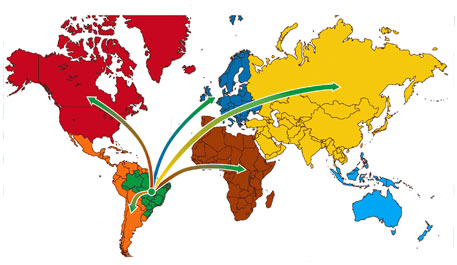
The Brazilian economy is the ninth largest in the world in terms of gross domestic product (START) e, despite having gone through moments of significant economic growth in recent decades, still faces a number of structural challenges. The diversification of international economic relations is one of the main strategies to face these challenges and ensure sustainable and balanced economic growth in the long term..
One of the main reasons why the diversification of international economic relations is important for Brazil is the country's vulnerability to fluctuations in commodity prices.. Brazil is one of the main world producers of commodities, like soy, sugar, coffee and iron ore. Although these products have been responsible for much of the country's economic growth in recent decades, overreliance on these exports can leave the economy vulnerable to external shocks, such as changes in the demand or supply of commodities in the international market.
Besides that, Brazil faces structural challenges in its economy, as poor infrastructure, a complex tax system and excessive bureaucracy. To overcome these obstacles, the country needs to attract foreign investment and advanced technologies, as well as increase the competitiveness of its products in international markets. The diversification of international economic relations is a way to achieve these goals, allowing Brazil to expand its commercial ties with new partners and regions of the world.
One of the ways in which Brazil can diversify its international economic relations is by expanding trade with countries in Asia., like china, India, Japan and South Korea. These countries are among the largest and most dynamic markets in the world., and Brazil can benefit from its growing demand for commodities and manufactured goods. Besides that, these countries have invested heavily in cutting-edge technologies, like artificial intelligence, robotics and biotechnology, and Brazil can take advantage of these opportunities to attract investments in high technology sectors.
Another way to diversify Brazil's international economic relations is to strengthen ties with the European Union. (EU) and other regions of the world. The EU is Brazil's second largest trading partner, after china, and the signing of the free trade agreement between the two blocs could open up new opportunities for Brazilian exporters. Besides that, Brazil can benefit from the EU's experience and technological know-how in areas such as renewable energies, biotechnology and infrastructure.
When we think of Eurasia, other options that arise are ASEAN and the Eurasian Economic Union. Brazil may also seek to expand its trade ties with countries in Latin America and the Caribbean. These countries are important trading partners of Brazil, and regional integration can lead to efficiency gains and economies of scale. Besides that, regional cooperation can help solve common challenges, such as lack of infrastructure and poverty.
It is important to highlight that it is also possible for Brazil to follow a strategy of signing bilateral agreements, but that would be a less interesting path. Multilateral agreements are generally considered better than bilateral agreements for several reasons:
1. Inclusion of more countries: Multilateral agreements include several countries, which means that the trade and economic benefits spread to a greater number of nations. This creates a wider trade network and increases economic interdependence between countries., reducing the possibility of trade conflicts.
2. Reduction of trade barriers: Multilateral agreements can help reduce trade barriers on several fronts, including tariffs, quotas and technical regulations. When more countries are involved in an agreement, there are more opportunities to reduce these barriers, which can improve trade efficiency and increase access to markets.
3. Power balance: In a bilateral agreement, there may be a power imbalance between the countries involved, which can lead to an unfavorable outcome for the weaker country. In a multilateral agreement, However, there is a greater balance of power between countries, which can lead to more equitable outcomes.
4. Standardization of regulations: Multilateral agreements can also help standardize regulations and business practices around the world.. This can help reduce confusion and friction between countries., making trading easier and more efficient.
5. Increased stability: Multilateral agreements can help increase stability and predictability in global trade. This can reduce uncertainty and volatility in markets, which can be beneficial to all parties involved.
